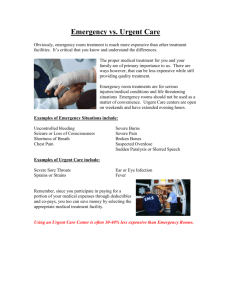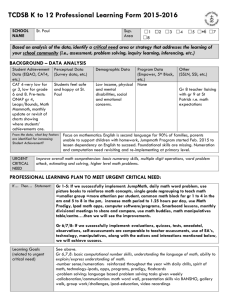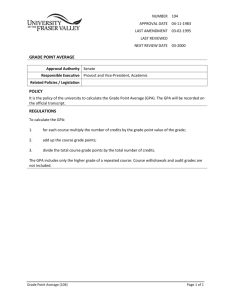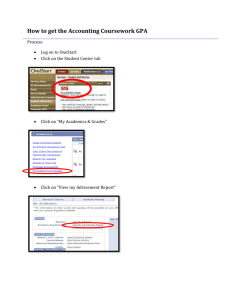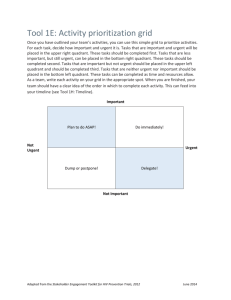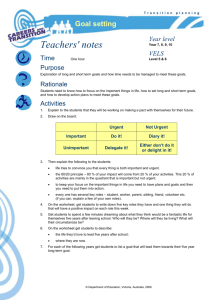Study Skills
advertisement
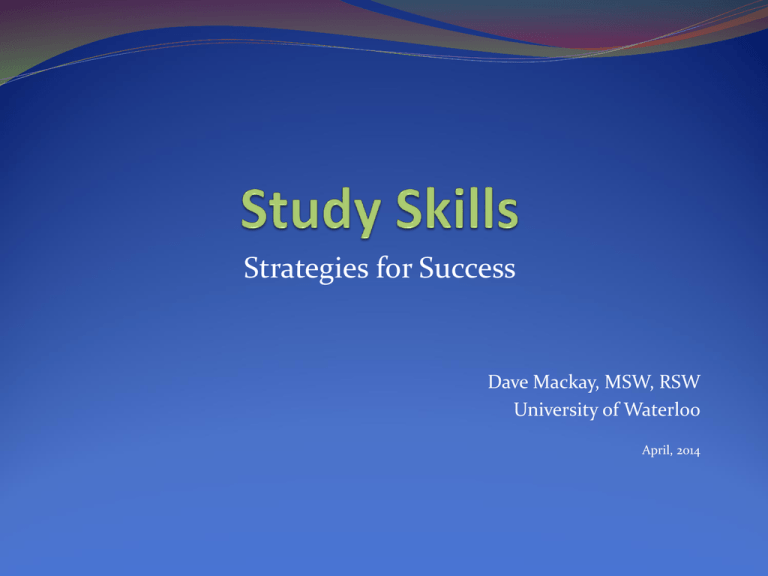
Strategies for Success Dave Mackay, MSW, RSW University of Waterloo April, 2014 Components of Academic Success Learning Styles Reading Skills Time management Test performance Memory and recall Persistence Note-taking Accessing Resources Concentration Learning Styles Visual Learners Auditory Learners Kinesthetic Learners Time Management Organization Efficiency Scheduling Study habits Setting priorities Lifestyle Procrastination Procrastination Organization Write down all of your assignment and test dates on a full term or school-year calendar Move from longer-term to shorter-term (monthly, to weekly, to daily) scheduling of tasks Try tracking your use of time for a week Setting Priorities Essential Not Essential Urgent Not Urgent Setting Priorities Essential Not Essential Urgent 1 Not Urgent Setting Priorities Essential Not Essential Urgent 1 Not Urgent 2 Setting Priorities Essential Not Essential Urgent 1 Not Urgent 2 3 Setting Priorities Essential Not Essential Urgent Not Urgent 1 3 2 4 Understanding Procrastination Fear of failure Fear of success Perfectionism Rebellion Overwhelmed Lack of interest An established pattern Overcoming Procrastination Plan a clear, realistic schedule in advance “First-minute” motivation Smallest achievable chunks Rewards Maximizing Recall The 50 - 10 Rule Review according to the “curve of forgetting” Curve of Forgetting 10 minutes 100% Day1 Day 2 5 minutes Day 7 2-4 minutes Day 30 Recall cont’d… Take advantage of your learning style preferences Don’t just review, practice too! Sleep for better grades! Adult’s Sleep Histogram R.E.M. Awake Stage 1 Stage 2 Stage 3 Stage 4 1 2 3 4 5 6 7 8 Hours of Consecutive Sleep Note-taking Read ahead whenever possible Review your notes according to the curve of forgetting Set up your notes with a mind for studying from them CLASS DATE PAGE # Notes from what teacher is saying or showing during class go here on right side of page (leave lots of space on the left side of the page) ** Leave space at bottom of page for “summary statements” CLASS After class, make up questions or key words to cue your recall of the notes you took during class and write them here. DATE PAGE # Notes from what teacher is saying or showing during class go here. e.g. What is it? Where do I find it? How do I use it? What is its importance? Summary statements…. Concentration & Distraction Examine your place of study, then make changes you can or consider moving Eat well. Sleep well. Be physically active. Multi tasking? Write down your distracting thoughts Take advantage of high energy times Circadian Rhythms 8am - 12pm High 12pm - 4pm Med 4pm - 6pm Low 6pm - 10pm Med After 10pm Rest Reading Skills Start with an overview (introduction, summary, titles, subtitles, tables, charts, graphs, bold print) Always read with a specific purpose or a question in mind Don’t get too comfortable Preparing for & Writing Exams Worry Being Prepared Put in the hours (without cramming) Be physically & mentally healthy Study by doing (active study) Practice getting unstuck Do I know my stuff? Can I say it in my own words? Can I give an example? Can I explain it to someone who doesn’t understand it? Writing the Exam Have a plan… and a back-up plan …. (not this) Essay Exams Problem Solving Exams Multiple Choice Exams After the exam Make note of what seemed to work or not work as you studied Make note of what seemed to work or not work as you wrote the test After the test is returned, look for patterns in your errors Correlates of University Persistence Longitudinal study, University of Calgary (M. Drysdale) Who continues after the first year? Variables: Age Gender High school grades Intended major/area of study University grades (1st semester, 1st year) Learning style (dominant and weakest) Significant Outcomes Interaction between : First term grades First year grades Declared major area of study Dominant learning style (used Gregorc Learning Styles) University GPA First term GPA: GPA < 2.00 (‘C’) 34% of those who did not continue GPA > 2.00 6% of those who did not continue First year GPA: GPA < 2.00 (‘C’) 40% of those who did not continue GPA > 2.00 6% of those who did not continue Intended Major 30% of those who had not declared a major were required to withdraw or dropped out vs 8% of those who had declared a major Younger students had more problems deciding on career Recommendations Know and work with your Learning Style Put some energy into Career exploration (ongoing) Learn and apply effective Study Skills (ongoing) Ask for help! Access resources!!! Study Skills Resources uwaterloo.ca/student-success/resources/online- resources Teachers, Family, Teaching Assistants, Classmates Find alternate textbooks for difficult courses Find old tests/exams and work through them Study skills books and tips on-line and at bookstores Private tutors, counsellors, and education agencies
